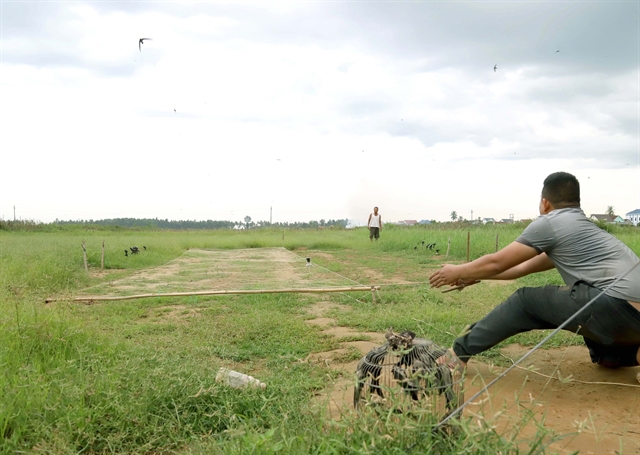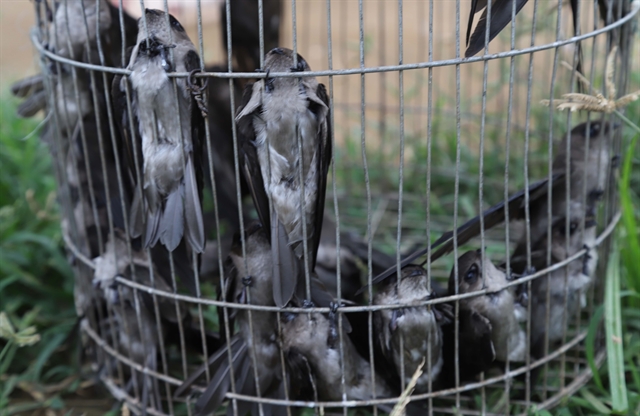.jpg) Environment
Environment


|
| Hunting for wild birds in Diễn Châu. VNA/VNS Photo Xuân Tiến |
NGHỆ AN Every year in September, at the paddy fields between Diễn Kim and Diễn Hải wards in Diễn Châu District, Nghệ An Province, the so-called "swallow hunting fever" begins.
Local residents equip themselves with "stealthy" nets made from white, fine threads, and battery-powered speakers playing artificial bird sounds to attract prey. They also use swallows as bait, tethering them with twine to wooden posts, allowing them to flutter and hop at low altitudes.
When the fake swallow sounds are emitted, the tethered bait birds will flap their wings and fly upwards, luring flocks of swallows to return and swoop down low.
The bird hunters sitting by the tent's entrance will quickly exert force to pull a net, which can span dozens of square meters, enveloping and capturing the swallows.
Lucky birds that escape will flutter upwards with cries as they witness their fellow swallows struggling within the net. After breaking free from the net, these birds will descend again to rescue their counterparts and, in turn, fall into the trap.
Grave of the wild birds
Diễn Châu District has a diverse ecological environment, featuring mangrove forests, casuarina forests, numerous ponds, lagoons, estuaries and river mouths suitable for various types of wild birds and migratory birds such as herons, swallows, storks, egrets, etc., seeking food and shelter.
During the rainy season and storms, people engage in hunting, shooting, and trapping these birds, leading to the creation of "graveyards" where birds are indiscriminately killed. This situation has alarming consequences as it directly damages the environment, disrupts the ecological balance, and significantly reduces the populations of various wild bird species.
On the coastal embankment preventing saltwater intrusion through the communes of Diễn Kim, Diễn Thịnh, Diễn Trung in Diễn Châu, it is easy to come across scenes of white herons, seemingly made of foam, tightly fixed on trees, near shrimp ponds, river mouths, and other locations. These are traps set to lure down the heron flocks, causing them to get caught in plastic traps or to be shot.
Bird hunting and trapping activities mainly occur during the early morning and late afternoon. The captured or shot birds are transported back to the village on the same day using motorcycles and sold to local residents in the area.
Phạm Bá Ái, Vice Chairman of the Diễn Thịnh Commune People's Committee, stated that the commune has a wide stretch of phi lao forest along the 4km coastal line. The issue of hunting and trapping birds was prevalent in the past. The local authorities have taken measures to prevent and address this problem.
During the season when herons return, the local authorities establish a management board to ban trapping, hunting and capturing birds. The commune's authorities send notifications to the local residents and broadcasts messages on the commune's public address system to strictly prohibit bird hunting, trapping, and capturing.
Individuals or households engaged in bird decoy making or using plastic materials for trapping, when detected, will face consequences. In cases of hunting and trapping in the forests, the local police, border guard forces, and military units will conduct patrols, inspections, apprehend offenders, and confiscate firearms.
Ái also mentioned that this year, herons migrated to the area later than usual. The bird hunting and trapping activities by local residents are covert and have decreased significantly. Not only local residents but also people from other areas come to hunt and trap birds in the area.

|
| Swallows captured in cages, awaiting delivery to restaurants. VNA/VNS Photo Xuân Tiến |
A collaboration needed
On August 2, the People's Committee of Diễn Châu District issued a document regarding the inspection and handling of violations related to the management of wild animals and migratory birds in the area. This letter was sent to the People's Committees of communes, townships, the Forest Protection Department, and relevant units and forces.
The People's Committee of Diễn Châu District has requested the District Forest Protection Department to provide advice to the People's Committees of communes and townships in directing the police, self-defense militia, commune forestry, etc., to organise the signing of commitments not to buy, raise, trap, hunt, trade and process illegally any migratory bird species within their respective areas.
They are also directed to cooperate with the People's Committees of communes and townships in organising inspections at markets, restaurants, fields, reservoirs, and ponds to prevent hunting, shooting, trapping, buying, selling, slaughtering, trading and processing of migratory bird species.
District police are responsible for directing the commune police forces to enhance inspections, confiscate and handle individuals using firearms to hunt migratory birds, and coordinate with local authorities and the forestry sector to dismantle and clear trapping equipment for bird hunting.
The Border Guard Station of Diễn Thành is tasked with increased patrols, strict checks in coastal communes, fishing ports, river mouths and estuaries to timely detect, apprehend, and deal with cases of buying, transporting, using decoy birds, setting bird traps, and hunting wild migratory bird species.
According to Lê Minh Nguyên, Head of the District Forest Protection Department in Diễn Châu District, the department has conducted extensive awareness campaigns in various communes. Banners and posters have been displayed to raise awareness, advising local residents not to hunt, trap, buy, transport, slaughter, trade, process, or store wild birds and migratory birds in markets.
The department has also organised the signing of commitments by residents, restaurants and businesses to strictly adhere to regulations regarding the protection of wild and migratory birds. Several communes have formed inspection teams to monitor hunting and trapping of wild animals in their respective areas and have issued notices to residents to strictly comply with regulations regarding hunting and trapping migratory bird species such as herons, storks and swallows.
Although the direct buying and selling of various wild and migratory bird species in local markets have seemingly disappeared, it has managed to persist under the radar of authorities.
Small-scale traders in the bird business have shifted to online platforms on social media for their sales. This indicates that in some communes, the inspection, control, and protection of wild and migratory birds are still lax. The coordination between local authorities and law enforcement agencies in safeguarding these birds is not yet seamless and timely.
The central provinces are currently in the midst of the rainy season, a time when various wild and migratory bird species such as swallows, herons, egrets, and sandpipers appear in abundance along coastal areas in search of food and shelter.
As an area with several kilometers of coastline, Diễn Châu District is one of the regions where these wild and migratory birds relocate for safety during the storm season. If local authorities, relevant agencies, and law enforcement do not implement effective measures for their protection, the wild birds' safe haven might become their own mass grave. VNS